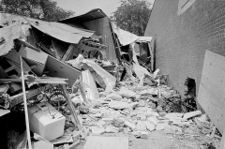Bombingham: Difference between revisions
Jump to navigation
Jump to search
| Line 41: | Line 41: | ||
* [[May 11]]: [[A. D. King]]'s [[A. D. King residence|residence]] in Birmingham | * [[May 11]]: [[A. D. King]]'s [[A. D. King residence|residence]] in Birmingham | ||
* [[May 11]]: [[A. G. Gaston Motel]] | * [[May 11]]: [[A. G. Gaston Motel]] | ||
* August: [[Loveman's]] department store | |||
* mid August: [[Arthur Shores]]' [[Arthur Shores residence|residence]] | * mid August: [[Arthur Shores]]' [[Arthur Shores residence|residence]] | ||
* [[September 4]]: Arthur Shores' residence. Bomb exploded while repairs were underway from previous blast. | * [[September 4]]: Arthur Shores' residence. Bomb exploded while repairs were underway from previous blast. | ||
Revision as of 00:52, 11 December 2008
This article is about the Birmingham nickname. For the 2002 novel, see Bombingham (novel).
Bombingham was a derisive nickname for Birmingham given because of numerous "unsolved" bombings of African American leaders' homes and meeting places during the Civil Rights Movement of the 1950s and '60s.
The nickname was used predominantly by African Americans.1 The name had been in use earlier, but by 1963, even before the 1963 bombing of 16th Street Baptist Church, the name was making the national press.1 With the 16th Street Baptist bombing, there had been 50 bombings in Birmingham since 1947 linked to race issues, all of them officially unsolved at the time.2
Notable bomb incidents
1956
- December 24: Fred Shuttlesworth's residence in Collegeville bombed, collapsing the parsonage.
1957
- April: Ashbury Howard residence in Bessemer.
- April: Allen Temple, church in Bessemer
- July: A home under construction on Dynamite Hill
- November: A home under construction in Bessemer
- December: One explosion damaged five houses on Dynamite Hill
1958
- April 28: Temple Beth-El, 54 sticks of dynamite placed, but failed to go off
- May: Dora Muldin residence in Birmingham
- June 29: Bethel Baptist Church in Collegeville
- July: William Blackwell residence
1959
1960
1961
1962
- January: New Bethel Baptist Church
- January: St Luke's Zion Church
- January: Trinity Church of God
- January: 4-unit apartment house under construction
- December: New Bethel Baptist Church
1963
- March: Howard Robinson residence in Birmingham
- May 11: A. D. King's residence in Birmingham
- May 11: A. G. Gaston Motel
- August: Loveman's department store
- mid August: Arthur Shores' residence
- September 4: Arthur Shores' residence. Bomb exploded while repairs were underway from previous blast.
- September 12: A. G. Gaston's residence in Robinwood
- September 15: 16th Street Baptist Church, 19 sticks of dynamite exploded on Sunday morning, killing 4 small girls.
1964
1965
- Our Lady Queen of the Universe Catholic Church, bomb disarmed during liturgy
References
- "Freedom--Now." (May 17, 1963). Time. Accessed January 30, 2007.
- Birnbaum, Jesse. (September 27, 1963). "Where the Starts Fall." Time. Accessed January 30, 2007.
- "20th Bombing Here Against Negroes" (September 16, 1963) Birmingham Post-Herald - accessed via Birmingham Public Library Digital Collection
